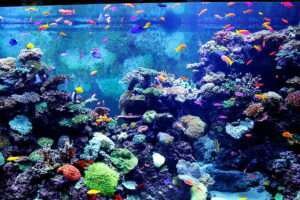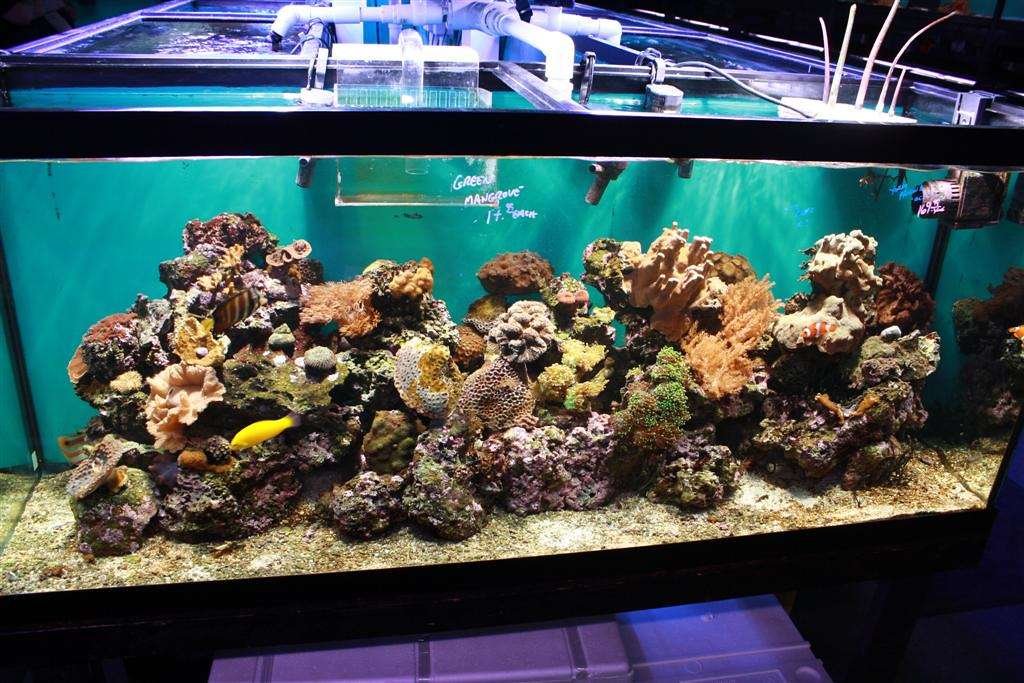What is the difference between saltwater and freshwater aquarium?
To start an aquarium hobby, you must decide whether you want a freshwater or saltwater aquarium. From there, you can begin the journey, choose the tank, filtration system, types of fish, plants, and any other decor you want, etc.
So before you start, you should know the difference between saltwater and freshwater aquarium. So that you do not get in trouble. Let’s dive in and explore the difference between saltwater and freshwater aquariums:
What makes Saltwater different from Freshwater Aquarium? Let’s find out.
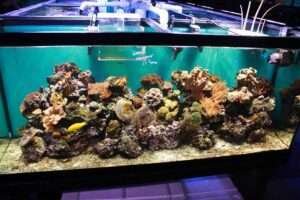
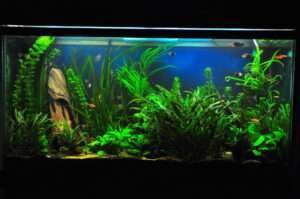
People can create a healthy freshwater or saltwater ecosystem by gaining more knowledge and working hard.
Both are easier to maintain if you have proper knowledge, but which is more challenging to keep, which is expensive, what is different between equipment, etc.?
1. Water parameters
The first difference is water parameters. The saltwater aquarium contains the appropriate salt level, around 3.0%-3.5%.
The freshwater aquarium contains between 0.5% and 1.0% of the proper salt level. A hydrometer measures the amount of salt.
Adding or changing water (saltwater aquarium)
Preparing the water for a saltwater tank is generally more complex. When adding saltwater to the tank, you must follow some rules. You can not use the tap water directly for the saltwater aquarium. You have to use a reverse osmosis deionization system (RODI) water. This system removes contaminants in city tap water and is more effective than chemical additives. Then, salt must be mixed with the (RODI) water. After mixing, You need to test the water to ensure you have the correct amount of salt. Now, Your water is ready for your aquarium.
Adding or changing water (freshwater aquarium)
Preparing the water for a freshwater tank is generally straightforward. Fill the aquarium with tap water and add the proper amount of de-chlorinator to remove fish-harming chlorine. Your water is ready.
2. Water testing system
After adding water to the aquarium, your job is not over. You have to check the water parameters regularly for a healthy ecosystem. You have to check:
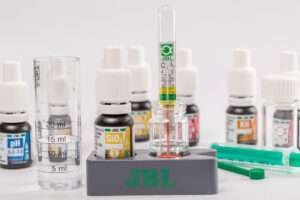
- salinity
- Ph
- Alkalinity (ALK/KH)
- Calcium (CA)
- Magnesium (MG)
- Nitrate (NO3)
- Phosphate (PO4)
- Ammonia (NH4)
- Nitrite (NO2)
- Oxygen (ORP)
- Temperature
3. Aquarium Equipment
Both freshwater and saltwater aquariums require a lot of equipment. However, saltwater aquariums need more equipment than freshwater aquariums.
First, see the list of equipment needed for both aquariums.
- Fish tank
- Fish tank stand
- Substrate
- Chillers
- Decor
- Thermometer
- Powerhead
- Water heater
- Water Test Kits
- Lights
- Filtration system
- Overflows & Returns
- Back-up power source
- Air Pumps
Here’s the extra equipment you need for a saltwater tank:
- Protein Skimmer
- Sea Salt
- Hydrometer
- aquarium controllers
- aquarium monitors
- Sumps
4. AQUARIUM Fish
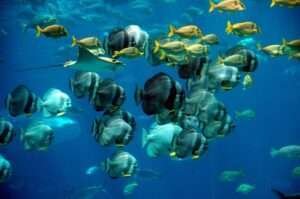

Here are some critical differences between saltwater aquarium fish and freshwater aquarium fish:
Salinity Requirements:
- Saltwater Fish: Saltwater fish require water with a specific salinity (salt content), typically around 32-35 parts per thousand (ppt). Maintaining this salinity level is crucial for their health.
- Freshwater Fish: As the name suggests, freshwater fish thrive in water with low salinity levels, usually less than 0.5 ppt. They cannot tolerate high levels of salt.
Aquarium Setup:
- Saltwater Fish: Setting up a saltwater aquarium involves more equipment and complexity. It requires a specialized saltwater mix to achieve the correct salinity and additional equipment, such as a protein skimmer and live rock.
- Freshwater Fish: Freshwater aquarium setups are generally more straightforward and less costly. They require a filtration system, a heater (sometimes), and decorations like gravel or plants.
Fish Variety and Color:
- Saltwater Fish: Saltwater fish are renowned for their vibrant colors and diverse shapes. They include clownfish, tangs, angelfish, and gobies, which are popular due to their striking appearance.
- Freshwater Fish: Freshwater fish also come in a wide range of colors and species but often exhibit more subdued colors than saltwater fish. Popular freshwater species include guppies, tetras, cichlids, and goldfish.
.
Maintenance:
- Saltwater Fish: Saltwater aquariums generally require more maintenance compared to freshwater setups. This includes regular testing and salinity adjustment, water chemistry monitoring, and careful attention to water quality.
- Freshwater Fish: Freshwater aquariums are typically easier to maintain. Water changes and basic water quality checks are essential but generally less demanding than those for saltwater tanks.
Cost:
- Saltwater Fish: Saltwater aquariums can be more expensive to set up and maintain due to the cost of specialized equipment, salt mixes, and sometimes more costly fish species.
- Freshwater Fish: Freshwater aquariums are often more budget-friendly regarding initial setup costs and ongoing maintenance.
Fish Behavior and Compatibility:
- Saltwater Fish: Some saltwater fish are territorial or aggressive and may require specific tank setups or careful selection of tankmates to prevent aggression.
- Freshwater Fish: Freshwater fish generally have more community-friendly options, and many species can coexist peacefully in the same tank.
In summary, while saltwater and freshwater aquariums offer beautiful fish and unique experiences, they differ significantly in setup complexity, maintenance requirements, and the types of fish that can be housed within them. Every kind of aquarium has its appeal and challenges, catering to different preferences and levels of expertise among aquarists.
5. Cost of Aquarium
Cost is a significant differentiating factor between saltwater and freshwater tanks. Even considering large freshwater setups, they typically remain more economical than saltwater alternatives. Opting for a saltwater tank can offer unique advantages if your budget allows. However, a freshwater setup presents a more budget-friendly option for those with limited financial resources who still aspire to own an aquarium.
Conclusion
There are many differences between saltwater and freshwater aquariums. Setting up and maintaining an aquarium requires commitment, so before you start shopping, make sure you know what you want. Do your research and read as much as you can about aquatic systems for the best aquarium maintenance.

